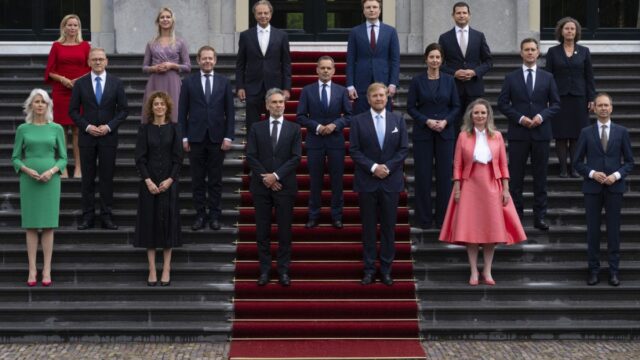The extreme right continues to expand its power in the EU, with the new Government of the Netherlands and the results of the first round of the elections in France. The expansion could impact the way decisions are made in Brussels institutions.
The governments of the Member States that have radical right-wing and eurosceptic political forcesThey will be able to choose two different paths to exert their influence on the future of the European Unionaccording to Dave Sinardet, political scientist at the Free University of Brussels, interviewed by ‘Euronews’.
“On the one hand, they could hollow out European politics from within. On the other hand, these far-right leaders could begin to understand that They also need the European Union to be able to fulfill a series of promises they made to their national electorate.especially in terms of security and immigration,” said the analyst.
Giving Dick Schoof, former head of the secret service agency, the presidency of the Government this Tuesday was the solution found to have operationala new executive in the Netherlands after the victory of the far-right Freedom Party, led by Geert Wilders, in the elections seven months ago.
The formal agreement creating the new coalition, titled ‘Hope, Courage and Pride’, introduces strict measures for asylum seekerseliminates family reunification for refugees and seeks to reduce the number of international students studying in the country.
A position that will impact the way in which the EU Migration and Asylum Pact will be implemented in this country and will be a reference for other Member States critical of the recently approved pact.
“In the case of migration policies, we have seen increasingly radical positions adopted by the European People’s Party (center-right). And regarding the Green Deal, It was paused a few months ago., before the European elections. So, The success of the extreme right is already something that is being translated into European policies in different ways,” explained the political scientist.
Will France be next?
Hungary is the only Member State with a radical right party with a majority in power. In addition to the Netherlands, the far right It is part of coalition governments in Italy, Finland, the Czech Republic and Croatia. France could be the next to join the trend given the results of June 30.
If the second round, on July 7, confirms the victory of the National Rally, centrist President Emmanuel Macron will be more isolated. Macron would control less internal policiessuch as those related to economy and justice, for example, and would have less influence in the European Councilwhich brings together the leaders of the 27 EU countries.
“What is clear is that the French president, Emmanuel Macron, is greatly weakened by the current election results and this probably won’t really change next Sunday,” says Dave Sinardet.
“He will, in fact, be a weakened president at the European table, which can also have a impact on the Franco-German axiswhich historically and still today is one of the main drivers of European politics,” he added.
A political file cannot be approved when four Member States, representing 35% of the EU population, abstain or vote against. In addition to migration and the Green Deal, some of the areas that could be most affected are the management of the war in Ukraine and support for candidate countries for EU membership.
But on these issues, the lack of common views can make it difficult to change course of action: “Leaders of far-right governments may hinder the functioning of the EU, but these leaders They are not necessarily aligned on all issues. In particular, when it comes to international politics and, for example, the war in Ukraine, it is not clear whether they will always be able to reach an agreement between themselves,” says the professor.
On the other hand, some far-right leaders even have a reputation for being quite constructive in the EU, as is the case of the Prime Minister of Italy, Giorgia Meloni. The current president of the European Commission, Ursula von der Leyen, often highlights that she is pro-European, pro-rule of law and pro-Ukraine, and that she can play an essential role in European policies over the next five years.







